Person Record
Metadata
Name |
Morton, Paul George Chapman (1910-2000) |
Born |
Apr 30, 1910 |
Birthplace |
Concord, VT |
Father |
Halley Morton |
Mother |
Amy (Chapman) Morton |
Notes |
Married in 1940 Buried in Cemetery No. 4 Taken from the Spring 2016 Newsletter: "Those who knew Paul Morton well, remember him as an eccentric, a hoarder, and a jack-of-all-trades. He spent most of his life in Conway, Denmark, and Lovell as a butcher, carpenter, store owner, historian, postal clerk, and Yankee trader. In a 1996 Bridgton News article, Morton said "with an impish expression spread across his face," he had experienced most jobs "except midwifery." Many residents recall his Odd Fellow’s Shop on Screw Ball Corner (5 Kimball Road) in Lovell. He filled it with antiques, books, bric-a-brac, and "just plain junk," but Paul tried several jobs before he and his wife invested most of their time selling their treasures. Born in Concord, Vermont April 30, 1910 to Halley and Amy (Chapman) Morton, Morton’s early years were spent in Vermont, but eventually his family moved to North Conway, and he attended Kennett High School, graduating in 1928. In high school he worked for Conway Box Company and made $70 per month. After high school he learned the trade of butcherer and worked in Conway Center Grocery Store as a meat market clerk, a skill and job he used many times throughout his life. Morton considered food his life. While working in the Conway Center Store, a man in a Model A Ford with a little box on the rear asked Morton to help peddle meat. Morton said this was the only business he ever knew. "I could lead your cow right up here, kill your cow, and hang it up, and when he gets tenderized and in good shape, I could bring it into the house, take it in the kitchen and carve it the way you wanted, steak or whatever, and I put it through the oven, serve it at the table, wait on the table, everything." He made deliveries three times a week to people who lived on the lakes in the area. They transported meat in a locker and provided groceries at the same time. "Many of the store’s patrons were wealthy socialite types from New York and Connecticut who were quite fussy about the way their pork chops and steaks were cut." This business brought him to Lovell, and he purchased the Center Store (Morton’s Market) in 1940, known as the Center Lovell Market now, and sold it six years later. He recalls, "I bought it on my birthday and sold it on Memorial Day." When he owned the store, he "didn’t beat anybody – didn’t lose any – didn’t make much, either – but that was all right. People knew where to get their soup bones!" During the Great Depression from 1932 to 1937, he appeared in Lovell working for Everett Heald as a meat market clerk, making $80 a month. Morton spent the rest of the 30s until 1952 working at the Denmark Inn near the outlet of Moose Pond in Denmark village during the summers. The inn served the parents of children who spent time at Camp Winona and Wyonegonic. Morton remembers acting as a bellhop, chambermaid, and anything else the owner needed or wanted, and his wife’s title was Housekeeping Counselor making sure everything in the inn was clean and tidy. He remembers Rose Kennedy and other "rich" parents of campers, but considered Kennedy a "nice person." During the winter he traveled with the camps’ owners, the Cobb family, to Vero Beach, Florida, where he served as a chauffeur. Morton said the Cobbs were "fine people." In 1940 he married Winona Gertrude Warren who was born in Steep Falls and attended Baldwin schools, graduating from Standish High School. Morton met Winona when he was "peddling roasts and chops and chickens. She was working in Fryeburg, and I had a customer out that way." She and Paul shared many interests. They liked to collect coins and stamps and had a strong interest in local history. "Nona" and Paul never had any children, and she died in 1987. From 1952 until 1961, Morton was a carpenter for Ralph McAllister of Lovell, working at private camps mainly around Kezar Lake. "I had quite a few camps I took care of, and I refinished the whole inside of one." He began another career as a postal clerk at age 61. While newspaper articles reported otherwise, postal documents show that Morton took the Civil Service Examination on April 21, 1971 and signed papers, took the oath of office, and became "Officer in Charge" of the North Fryeburg, Maine, U.S. Post Office, September 24, 1971. Eventually he worked at the Center Lovell Post Office as a clerk. Everyone stated he was too old to start another career, but Morton obviously enjoyed switching jobs and learning new skills. Morton thought it was a "crazy thing" to add zip codes to the mail. Before zip codes "we had a post office in Sweden, they had one in Fryeburg Harbor, two or three in Fryeburg Center, West Fryeburg, East Conway, every little place had a post office. Now they do not have any." He believed it slowed the mail. "That’s progress, I suppose, but I don’t call it that." Paul and Winona Morton and Reverend and Mrs. John Dallinger started the Lovell Historical Society March 25, 1973 by meeting informally at the Reverend’s home. They discussed the pros and cons of the items in the booklet "Forming a Local Historical Society." After this initial meeting, it was decided a group representing areas of the town meet at the Center Church Vestry. The group was chosen for "their known interest in the preserving of town history and historical items." When Lovell residents viewed the Historical Society exhibit at the Bicentennial celebration, they became excited about collecting items and finding a place for the collection. According to Roberta Chandler, an early member of the Society, Morton was always there to help with fund raising and was "our greatest cheerleader." It was "one of his dreams" to create a historical society the town would appreciate. He served as president in 1985 and 1986, and he was actively involved until the death of his wife. Morton collected antiques and junk. He always believed he could recognize a bargain and turn it around and make a profit. He reflected, "I’ve been at it [buying and selling] all my life; when I was a kid, I swapped jackknives." He and his wife launched the Odd Fellow’s Shop together. She finally joined him in his hobby out of frustration. He came home one night with a load of things Winona considered junk. She faced the truth that her husband could not stop himself from "dickering and collecting." Winona lamented he would buy "just about anything from anybody." She decided to create a trading center, and this is how the Odd Fellow’s Shop began. Morton purchased items, and Winona sold them. He noted, "I could buy a sugar bowl for five cents that was worth $5. I could smell a good trade and make a few dollars." Morton always poked in people’s yards, looking for items to buy. He was the true definition of a Yankee trader. For 40 years, just about any unusual item could be found at the Odd Fellows Shop on the first floor of the Morton home on Route 5. One journalist found china, glassware, wall telephone, bear trap, farm machinery which predated the Model T, and magazines published in the 1800s all on the same day. Grammar and high school students, who caddied at the golf course nearby, walked the few feet to the shop to buy candy and soda. Morton puffed on a pipe, blinked his eyes, and joked, "Oh, my God, Man." Everyone who knew Morton considered him eccentric! He became famous when a national television show interviewed him about author Stephen King who Morton referred to as "Steve." Later on, a Boston television station came to Maine to interview Morton. In addition, journalists from The Bridgton News, The Boston Herald, and Yankee Magazine wrote articles about him. When asked about the quality of life in Lovell, Morton insisted that "quality of life is just what you make it. If you want friends, you can have friends. If you don’t want friends you don’t have to have them. And if you want them and like them, they’re there." He thought Lovell was the best town he ever lived, but he liked people, and he met them half way to become friends. For entertainment he visited neighbors. A nearby friend, a widow, used to play the piano and Morton played the drums. She was the only one he could talk to about the old times. In 1995 when Morton lived alone at age 85, he looked back at his time in Lovell and considered how the quality of life had changed. He observed how new people move to the area and old people "drop out." An individual cannot keep track of the changes unless he or she works at the town office. "To know everyone is impossible" since many are summer or weekend visitors. The village changed over his lifetime according to Morton. A large grocery store, hardware store, furniture store, telephone office, and gas pumps existed for many years, but the roads were not much improved until the late 1920s. Morton laughed that "a mortician was on duty at all times." The old wood mill disappeared in a flood in 1953. Electricity was added in the village in 1927 and ran up the village through the center, but it didn’t get to Slab City until President Roosevelt and the Rural Electrification Act. Morton remembers that’s "when they branched out and went into little country hamlets." Kezar Lake changed over the years, also. When Morton first peddled meat in 1931 around Kezar Lake, few owned motor boats. People mostly rowed a boat and fished. When "boys from Harvard" came here in 1889, they returned every summer to camp on Sheep and Rattlesnake Islands. Five of them bought Rattlesnake Island in 1900, and the growth around the lake exploded. Morton said the visitors to the lake "probably made part of the town." Rudy Vallee owned a place on the lake along with other affluent people who lived in their vacation homes part of the year. In 1995, Morton shared his favorite memory of Lovell: It’s a silly one I know but I came in here, I was a young man then, I was 21 when this fellow brought me in peddling meat. Every tarred-paper camp - I’m talking about shacks we call ‘em - and the poorest of ‘em had rambler roses and usually a trellis. They were poor; they were honest people but they were poor. And there were bigger houses, the more affluent and they had bigger trellises but they all had rambler roses and that is the first memory of Lovell I have. That was the thing I saw. That isn’t history but it’s fun. Paul George Chapman Morton died November 17, 2000 at the age of 90. He was survived by his sister, Louise Helen Morton Perrin of Ann Arbor, Michigan, and his friend, Priscilla Beckloff of Lansdale, Pennsylvania, who grew up with the Morton family. His "just plain junk" was auctioned off by J.H. Morrison Co., and their advertisement for the auction included the following: Mr. Morton was a life-long antique enthusiast whose discerning eye was well known of frequenters of his antique shop. A true Maine Yankee, Mr. Morton sold only to fuel his passion of the hunt, packing away his favorites. Every closet, spare room and crawl space was packed with boxes and trunks, brimming with local history. Mr. Morton was always interested in the past and the objects that brought it to life, and was a founding member of the Lovell Historical Society, as well as a member of the Concord, Vermont Historical Society. Paul Morton lived a simple life, trying a variety of jobs, but his passion revolved around history. He enjoyed objects and persons who represented time and place. He listened to yarns from old-town Mainers, and he shared a narrative history with everyone he met, keeping Lovell alive with his laughter and storytelling. He learned to poke fun at himself and life. He refused to worry about things he had no control over. He reminisced with a sigh, "I’ve had a good life. It’s had a lot of ups and downs, and that’s all right. You get out of life what you put into it." |
Occupation |
Owner operator of the "Odd Fellow's Shop" Stamp & Coin & Antique Dealer Postal Worker, Caretaker. Worked at camps Winona and Wyonagonic in Denmark |
Spouse |
Winona Gertrude (Warren) Morton |
Deceased |
Nov 17, 2000 |
Deceased Where |
Fryeburg, ME |
Titles & honors |
With his wife founding members of the Lovell Historical Society |
Related Records
-
29. Jonathan Hatch Tape 1 - Donald Chandler, Paul Morton, Ed Nista - 1995.05.0025
In 1995, for his Senior Project at the College of the Atlantic, Jonathan Hatch interviewed and photographed 26 residents of Lovell. His purpose was "not only to interpret but to portray and represent the various perspectives of a small rural town in Maine". He gave exclusive rights to the tapes and accompanying transcripts to the Lovell Historical Society.
Record Type: Archive

-
Bud Wilson at Morton's Market - 2012.04.0169
Bud Wilson in front of Morton's Market, in Center Lovell. Taken from Photo CD #7. Used in the Spring 2016 Newsletter.
Record Type: Photo
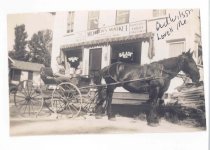
-
Chronicle's "Kezar Lake", 1990 - 2009.19.0001
A copy of a Channel 5 Boston show titled Chronicle. The show was aired in 1990 and focused on Kezar Lake. Among the people interviewed were: Pete Koutrakis, Jane Orans, Rob Littlefield, Ric Eland and Paul Morton.
Record Type: Archive

-
Earle Keniston at Paul Morton's Home - 2011.03.0096
Identified as "Paul Morton's Estate" with Earle Keniston furthest to the right. The other two men are not identified. Taken from Photo CD #6.
Record Type: Photo
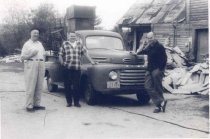
-
Journal of Paul Morton, 1925 - 2001.04.0023
Paul Morton's daily journal from January 1 to April 29, 1925. Located in Journals & Diaries, Box 2.
Record Type: Archive

-
Lovell Cemetery Records, Volume I & II - 2007.31.0001
An update of Lovell's Cemetery Records, originally compiled by Irene St. Germain in 2006 and 2007. A major update was done in 2015, 2019, and 2022. Volume I has an index of names to be found in all Lovell cemeteries and the details on the #4 Cemetery . Volume II has the details on the Center Lovell Cemetery, Fox Cemetery, Lord Cemetery, North Lovell Cemetery, Village, West Lovell Cemeteries, private cemeteries, and an Appendix. The Appendix con...
Record Type: Archive

-
Morton, Paul - 1974.02.0864
Collection of information about Paul Morton's and his antique shop known as the Odd Fellow's Shop. Located in the file category "People". Paul was the subject of the Spring 2016 Newsletter.
Record Type: Archive

-
Obituaries - 1974.02.0692
Nine notebooks of obituary newsclippings, all indexed.
Record Type: Archive

-
Paul G. Morton - 1995.05.0003
Eight photos of Paul Morton at his shop. Taken from the Word & Portrait Stories Collection by Jonathan Hatch. In 1995, for his Senior Project at the College of the Atlantic, Hatch interviewed and photographed 26 residents of Lovell. His purpose was "not only to interpret but to portray and represent the various perspectives of a small rural town in Maine". He gave exclusive rights to the tapes and accompanying transcripts to the Lovell Historical...
Record Type: Photo
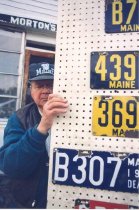
-
Paul Morton and Lissa Perrin - 2008.03.0006
Paul Morton, age 87 with his niece, Lissa Perrin, age 48. The photo was taken in July 1997 in front of Paul's house at #4.
Record Type: Photo
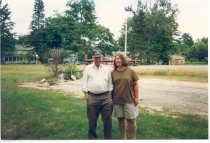
-
Paul Morton and Rachael Sholder - 2008.03.0005
Paul Morton, age 87, with his great-niece, Rachael Sholder, age 16. The photo was taken in July 1997 in front of Paul's house at #4.
Record Type: Photo
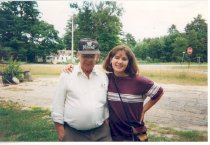
-
Paul Morton at North Fryeburg Post Office - 2007.20.0003
Two photos of Paul Morton working at the North Fryeburg Post Office, dated Jan. 1972. Taken from Photo CD #11.
Record Type: Photo
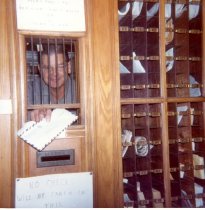
-
Paul Morton at the Post Office, 1972 - 2007.20.0002
Paul Morton working at the Post Office in North Fryeburg. The photo is dated January 1972. Taken from Photo CD #11.
Record Type: Photo
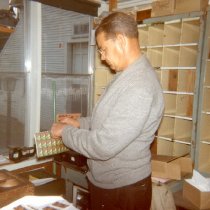
-
Paul Morton, Priscilla Johnstone & Peg Evans - 2007.20.0004
Paul Morton at the Center Lovell Post Office with Priscilla Johnstone and Peg Evans. Taken from Photo CD #11.
Record Type: Photo
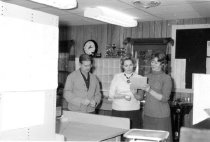
-
Paul Morton with Flowers - 2018.13.0001
Paul Morton holding a bouquet of flowers. The camera photo date is 4/30/1998.
Record Type: Photo
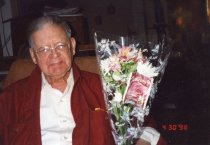
-
Paul & Winona Morton - 2011.03.0042
Paul and Winona Morton. Taken from Photo CD #6. Used in the Spring 2016 and Summer 2024 Newsletters.
Record Type: Photo
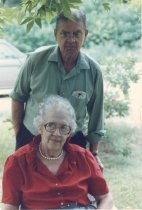
-
Paul & Winona Morton in Costume, 1976 - 2015.35.0032
Paul and Winona Morton dressed in costume for the Bicentennial celebration on July 6, 1975. Taken from Photo CD #11. Used in the Spring 2016 Newsletter.
Record Type: Photo
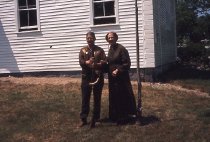
-
Scrapbook 35 - Paul Morton - 2007.20.0001
Scrapbook compiled by Winona Morton of her husband Paul's postal career in the early 1970's. The book includes photographs and stamps when he worked in North Fryeburg and Center Lovell.
Record Type: Archive

-
Word & Portrait Stories by Jonathan Hatch - 1995.05.0024
Transcripts of oral histories Jonathan Hatch took in 1995. This was a Senior Project he conducted at the College of the Atlantic. The tapes have been transferred to CDs and are also available on the computer. There are also slides.
Record Type: Archive


